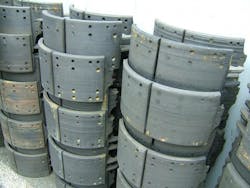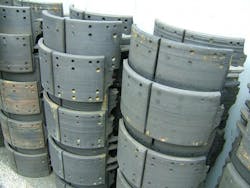It’s a problem not just limited to truck and trailer parts, either; in fact, there’s been a noted rise in all kinds of counterfeit goods across the board, from everything such as toothpaste right up to cancer-fighting drugs. And according to a white paper written by supply chain expert John DiPalo of Acsis, the problem is only going to get worse.
Counterfeiting is now one of the fastest growing and profitable industries in the world, he explained, making up an average of 5% to 7% of world trade – meaning it’s a $600 billion per year industry. The U.S. Customs and Border Protection (CBP) reports the total number of counterfeit goods increased dramatically in fiscal year 2011 by 24% compared to fiscal 2010, and has increased 325% over the past decade.
“The impact and cost across industries is quite staggering,” DiPalo said. “The Federal Trade Commission (FTC) reports that counterfeit automotive parts total approximately $12 billion annually, while resulting in 200,000 fewer manufacturing jobs. Additionally, the electronics industry experts [loses] between $100 billion and $200 billion annually. Of particular concern is the pharmaceutical industry, in which counterfeit drugs account for $75 billion dollars globally.”
[Truck component makers aren’t sitting on their hands when it comes to counterfeiting, by the way. Note the video below, produced by Bendix Commercial Vehicle Systems, that’s part of an ongoing outreach effort to make truckers aware of the scope and sophistication of the counterfeiting problem.]
Indeed, product piracy now occurs in just about every type and grade of consumer goods, DiPalo noted – including shampoo, cosmetics, cigarettes, food, DVDs, perfume, pharmaceuticals, electronics, automotive and airplane parts have all been recent targets. Worse yet, he pointed out that those numbers might even be on the low side since many bogus items may still be unaccounted for – and therefore go unreported.
“Counterfeiters have gotten much more sophisticated at developing legitimate-looking stores and goods, which is especially true when items are sold online,” DiPalo added. “Fake websites employ state-of-the-art promotional tactics, such as featuring near-perfect replicas of certain logos, realistic merchandise photos, etc., to lure unsuspecting buyers, making it nearly impossible to distinguish what’s real and what isn’t. Combine it with a booming consumer demand for popular brands, and it’s no wonder counterfeiting has been referred to as ‘the crime of the 21st century.’”According to DiPalo, the manufacturing of counterfeits is most prevalent in countries with a strong, inexpensive manufacturing capability, including many nations throughout Asia such as China and Taiwan. Often made in developing countries with limited regulatory oversight, the knockoff business drains economies and has been linked to organized crime or criminal activity, which poses serious threats to consumers, companies, and national security, he said.
According to DiPalo, the manufacturing of counterfeits is most prevalent in countries with a strong, inexpensive manufacturing capability, including many nations throughout Asia such as China and Taiwan. Often made in developing countries with limited regulatory oversight, the knockoff business drains economies and has been linked to organized crime or criminal activity, which poses serious threats to consumers, companies, and national security, he said.
Here are some examples DiPalo pointed to:
- More than one million counterfeit electrical products have been recalled in recent years, including extension cords, power strips and batteries. Not only can such sub-standard goods destroy electronic devices, they pose a serious fire hazard, too, noted the Electrical Safety Foundation International.
- According to the U.S. Chamber of Commerce, 64% of counterfeit electrical products are purchased from legitimate shops and retailers. However, many illegitimate power adapters continue to be sold on-line, via services such as eBay.
- In 2009, the World Health Organization warned that a counterfeit anti-diabetic medication reached the Chinese market and contained six times the normal amount of its active ingredient, glibenclamide, resulting in nine hospitalizations and two deaths.
- This past year the Food and Drug Administration discovered fake versions of Adderall, a drug used to treat attention deficit hyperactivity disorder, as well as phony vials of the cancer drug Avastin, which had made its way into doctors' offices.
He pointed out that counterfeiters weaken the supply chain by exposing broken links and inadequate product monitoring systems, enabling them to “slip through the back door” and into the marketplace.
“Simply put, anything that is manufactured can be counterfeited,” he said. “Without a proper checks and balance system, companies are sitting ducks if they haven’t evaluated – and truly tested – their quality-assurance and anti-counterfeiting strategies.”
Indeed, in an age when all parties (DiPalo's italics here, not mine) are responsible for the product once it leaves their four walls, it’s no surprise that true product visibility throughout a supply chain is not only a necessity but a means of survival, he emphasized.
“Risks always lurk in the supply chain, and the farther the chain stretches, the greater the vulnerability. How companies develop and execute strategies against counterfeiters can spell the difference between continued brand integrity and a shattered business,” he warned.
Yet DiPalo also puts some of the onus for the counterfeit problem on the backs of buyers as well.
“In an economy where everyone is trying to save money, it is often hard to pass up what looks like a great deal,” he explained. “But it’s important to remember that in nearly every instance, counterfeited goods are often made with inferior materials and not held to the high standards as the original. Despite this well-meaning intention of trying to spend less, in the end, it’s just not worth the risk.”
Something to think about at the very least.



